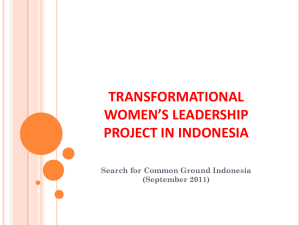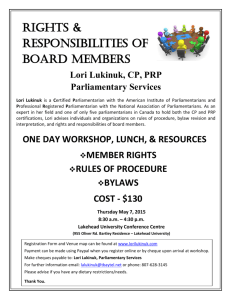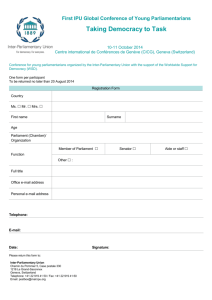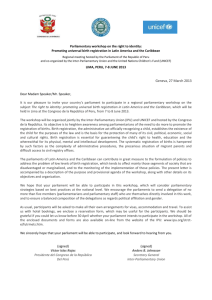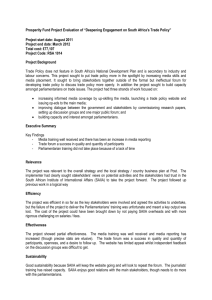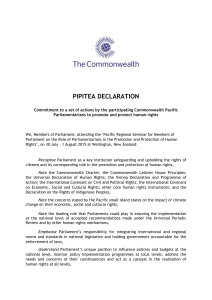Current Research Journal of Social Sciences 4(3): 213-221, 2012 ISSN: 2041-3246
advertisement
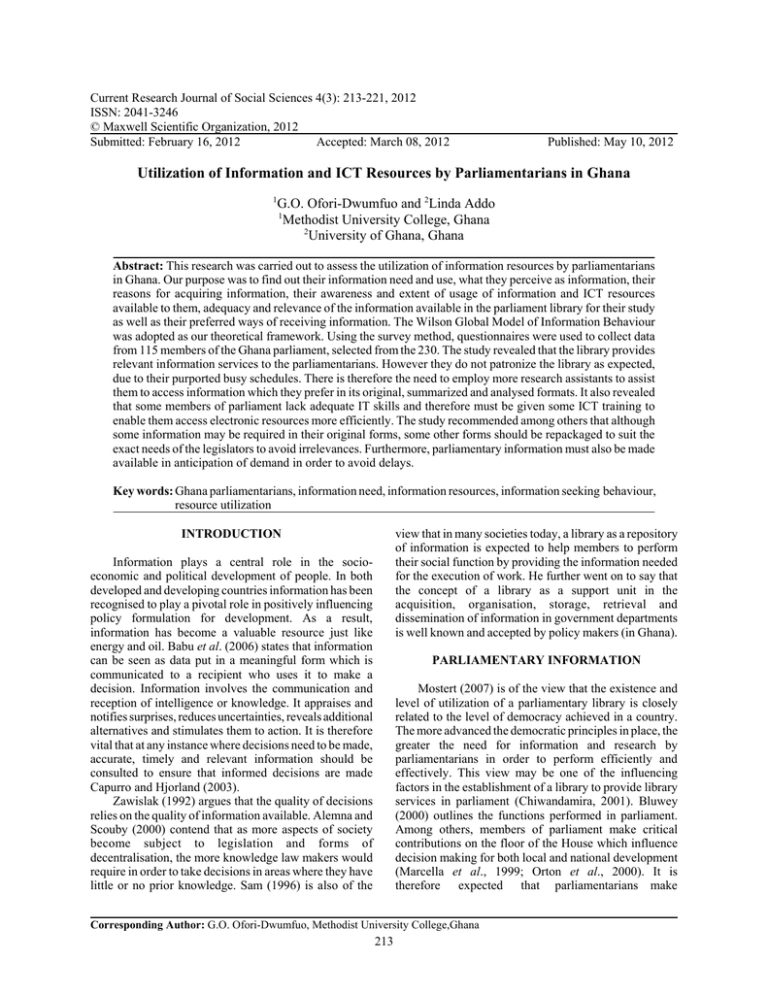
Current Research Journal of Social Sciences 4(3): 213-221, 2012 ISSN: 2041-3246 © Maxwell Scientific Organization, 2012 Submitted: February 16, 2012 Accepted: March 08, 2012 Published: May 10, 2012 Utilization of Information and ICT Resources by Parliamentarians in Ghana 1 G.O. Ofori-Dwumfuo and 2Linda Addo 1 Methodist University College, Ghana 2 University of Ghana, Ghana Abstract: This research was carried out to assess the utilization of information resources by parliamentarians in Ghana. Our purpose was to find out their information need and use, what they perceive as information, their reasons for acquiring information, their awareness and extent of usage of information and ICT resources available to them, adequacy and relevance of the information available in the parliament library for their study as well as their preferred ways of receiving information. The Wilson Global Model of Information Behaviour was adopted as our theoretical framework. Using the survey method, questionnaires were used to collect data from 115 members of the Ghana parliament, selected from the 230. The study revealed that the library provides relevant information services to the parliamentarians. However they do not patronize the library as expected, due to their purported busy schedules. There is therefore the need to employ more research assistants to assist them to access information which they prefer in its original, summarized and analysed formats. It also revealed that some members of parliament lack adequate IT skills and therefore must be given some ICT training to enable them access electronic resources more efficiently. The study recommended among others that although some information may be required in their original forms, some other forms should be repackaged to suit the exact needs of the legislators to avoid irrelevances. Furthermore, parliamentary information must also be made available in anticipation of demand in order to avoid delays. Key words: Ghana parliamentarians, information need, information resources, information seeking behaviour, resource utilization view that in many societies today, a library as a repository of information is expected to help members to perform their social function by providing the information needed for the execution of work. He further went on to say that the concept of a library as a support unit in the acquisition, organisation, storage, retrieval and dissemination of information in government departments is well known and accepted by policy makers (in Ghana). INTRODUCTION Information plays a central role in the socioeconomic and political development of people. In both developed and developing countries information has been recognised to play a pivotal role in positively influencing policy formulation for development. As a result, information has become a valuable resource just like energy and oil. Babu et al. (2006) states that information can be seen as data put in a meaningful form which is communicated to a recipient who uses it to make a decision. Information involves the communication and reception of intelligence or knowledge. It appraises and notifies surprises, reduces uncertainties, reveals additional alternatives and stimulates them to action. It is therefore vital that at any instance where decisions need to be made, accurate, timely and relevant information should be consulted to ensure that informed decisions are made Capurro and Hjorland (2003). Zawislak (1992) argues that the quality of decisions relies on the quality of information available. Alemna and Scouby (2000) contend that as more aspects of society become subject to legislation and forms of decentralisation, the more knowledge law makers would require in order to take decisions in areas where they have little or no prior knowledge. Sam (1996) is also of the PARLIAMENTARY INFORMATION Mostert (2007) is of the view that the existence and level of utilization of a parliamentary library is closely related to the level of democracy achieved in a country. The more advanced the democratic principles in place, the greater the need for information and research by parliamentarians in order to perform efficiently and effectively. This view may be one of the influencing factors in the establishment of a library to provide library services in parliament (Chiwandamira, 2001). Bluwey (2000) outlines the functions performed in parliament. Among others, members of parliament make critical contributions on the floor of the House which influence decision making for both local and national development (Marcella et al., 1999; Orton et al., 2000). It is therefore expected that parliamentarians make Corresponding Author: G.O. Ofori-Dwumfuo, Methodist University College,Ghana 213 Cur. Res. J. Soc. Sci.,4(3): 213-221, 2012 Wilson’s global model of information behaviour: A number of information and communication theories have been developed. The Wilson (1999) Global Model of Information Behaviour was selected as the conceptual framework for us to study the information needs and use behaviour of the Ghanaian parliamentarians. Wilson’s model has been employed by many researchers in their work involving information use and users (Case, 2002). According to Niedzwiedzka (2003) the model represents a range of influencing factors affecting information use. These factors range from cognitive and social to environmental. According to Wilson (1999), information needs are circumstantial (condition dependent). A person’s need is particularly situated within a context and it is influenced by the role the person plays at work and the environment in which he finds himself. The environment could be political, economic, technological, cultural or social. Wilson also indicated that the information needs of an individual arise because of the social role he/she plays in society. Thus, in the working environment the information needs of a teacher may differ from that of a lawyer. The individual’s position on the job and professional hierarchy will also indicate his/her specific information needs. Furthermore, it is important to know the person’s background, level of education, experiences gained at their various workplaces. Again, Wilson (1999) talks about two modes of obtaining information which are the phase of acquiring information and the phase of processing and using information. Wilson’s model thus provides a good frame for thinking about the processes of acquiring and use of information by the parliamentarians. It therefore, forms the basis for our research study. maximum use of the library which is stocked with an enormous wealth of information. Ghana parliament: Ghana’s parliamentary history dates back to 1850, when the country was known as Gold Coast under the British Colony. During this time, the Legislative Council was purely an advisory body since the governor exercised all legislative and executive powers. A new constitution allowed for an unofficial member of the Legislative Council to become its president while the governor became the ex-officio president of the body. This system was continued until 1951 when a constitution was drawn giving power to the legislature to elect its own speaker. When Ghana gained independence in 1957, the name of the legislative assembly was changed to National Assembly. In 1960, Ghana became a republic and the presidential system was adopted. Ghana later experienced a number of military regimes which continually dissolved parliament and disbanded the constitution. In 1993, Ghana returned to constitutional rule which provided for an elected multiparty democratic parliament with a membership of two hundred (Alemna and Scouby, 2000). With the recent creation of more constituencies the current membership of the Ghana parliament is two hundred and thirty. Preliminary investigations revealed that the usage of the library resources by these Ghanaian parliamentarians is not satisfactory. The library staff indicated that members of the Ghana parliament do not often visit the library to use the resources available. Furthermore, research assistants assigned to them lack information accessing skills. The ultimate result of not adequately using these resources is the absence of substantial backups for parliamentary motions, which often leads to the rejection of the presenters’ view-points. This in turn brings about embarrassment and less contribution by parliamentary members. Parliament of Ghana library: The library of the parliament of Ghana before independence had been in existence to collect and keep custody of the legislative assembly documents. The successor national assembly and the various governments over the years recognised the need to keep and expand this facility in order to establish a parliamentary library and information centre of high standards. The principal tasks of the library are to serve members of parliament, its committees and its presidium and to support the legislative process. The library has a good collection of books, reference materials and hansards (official reports of parliamentary debates), order papers, reports from various committees and organisations, periodicals, journals, newspapers, theses, press releases and speeches. There are official publications like Gazettes, legal statutes, conference and seminar papers, session addresses, audiovisual materials including videotapes of public forums and albums. Various office equipments and microcomputers with internet and intranet facilities are also provided to support library study. Research objectives: This study seeks to examine the extent of usage of information and ICT resources by Ghanaian parliamentarians and the reasons for their poor usage of the library (Addo, 2011). Specifically, we would want to: C C C C C Find out the types of information needed by the parliamentarians Find out how the parliamentarians obtain information Examine the quality of information and their relevance to parliamentary study Find out the constraints encountered by the members of parliament in seeking for information and Make recommendations based on the findings to resolve known problems 214 Cur. Res. J. Soc. Sci.,4(3): 213-221, 2012 Table 1: Gender of respondents Gender Male Female Total The parliament library objectives: The library exists to: C C C C Provide active information, research and bibliographic services to support the functions of parliament. Acquire, organise and maintain literature and audiovisual materials pertinent to legislative activities. Disseminate the value added information to both members of parliament and staff through reference and current awareness services. Provide specialised information including newspaper indexing, media-monitoring and other library services. representativeness of a population, one way is to select a minimum of 50%.). Questionnaires were then developed to investigate the information seeking behaviour of the selected parliamentarians (Alemna and Scouby, 2000). Due to the apparent busy nature of the legislators and the difficulty in getting access to them, we had only 81 of them responding to the questionnaires. Secondary data was also gathered from textbooks, articles from journals and electronic resources. Other services include lending, references and information research, photocopying, provision of interlibrary loan and document delivery and reference and current awareness services, internet searches and online services (Rugambwa, 2010). Data analysis and findings: The data analysis is guided by the main objective that seeks to determine the utilization of information resources by the parliamentarians in Ghana. The results are grouped according to responses. Functions of the Ghana parliament library: The Ghana parliament library carries out the following main functions. C C C C Frequency 69 12 81 Background information of respondents: The parliamentarians responded to questions on the status of their gender. The results revealed that 69 (85.2%) of them were male and 12 (14.8%) female, showing that the parliament of Ghana has more male representatives than female (Table 1). Offering services to support members of parliament and other users with the necessary information needed to enable them perform their functions. Alert members to new information that pertains to their constituencies. Provision of quick information. Provision of book lists to members bi-annually (unpublished brochures of the parliament house library). Mostert (2004) states that parliamentarians are the democratically elected representatives of the nation. To merit their positions they need to demonstrate the ability to effectively participate in parliamentary processes. Effective participation implies the ability to make informed decisions and when necessary, disseminate them to their constituents. Fiankor (2009) discusses the aspect of providing information for decision-making in District Assemblies of Ghana. District Assemblies function on a level similar to that of parliament, but at the district levels rather than national. Fig. 1: Educational qualification of respondents METHODOLOGY Data collection: Data was obtained from primary and secondary sources. The primary data was gathered from the sampled population involved in the study (Vaus de, 2001). Sampling is a technique that allows a researcher to make inferences about a population based on the nature of the sample. In this study, we cover some parliamentarians. With the 230 parliamentarians in Ghana, we selected 115. (Khan (2006) is of the view that while there are various ways of determining sample size needed to achieve Fig. 2: Number of terms in parliament 215 Cur. Res. J. Soc. Sci.,4(3): 213-221, 2012 Table 2: Perception of information by parliamentarians Category What parliamentarians perceive as information A All published and unpublished materials B All items in newspapers, radio and TV C All discussions at meetings, conferences, seminars and workshop D All of A, B and C E All items in newspapers, radio, TV and discussions at meetings, conferences, seminars and workshop. F All published and unpublished materials, All items in newspapers, radio and TV and Government publications, circulars, reports and pamphlets. Total Table 3: Need for information by parliamentarians Category Reason for need for information A Preparing for parliamentary speeches, debates and questions B Preparing answers for enquiries from the constituents C All of A and B D Beneficial to assigned tasks and my constituents E Current awareness purposes F Preparing for parliamentary speeches, debates and questions and statistical or data analysis Total We also wanted to know of the highest level of education attained by respondents since this can influence the efficiency of their access to and use of information. We found that most of the Ghanaian parliamentarians, 40 (49.4%), had their highest educational levels as first degree holders and 3 (3.7%) had acquired doctorate degrees (Ph.D). This we found to be quite impressive. However, there were a few respondents, 6 (7.4%) and 11 (13.6%), who had A level qualifications and Diplomas respectively (Fig. 1). The legislators answered questions on the number of terms served in the Parliament of Ghana. It was revealed that 45 (55.6%) respondents had served twice and 20 (24.7%) had been there for just one term. A few (9.9%) indicated that they had been in the Parliament of Ghana for three or four terms (Fig. 2). This suggests that the majority of the parliamentarians had served for more than one term; and this would certainly reflect on the efficiency of their access to and use of information. Frequency 34 6 22 6 6 7 81 Frequency 18 1 29 10 22 1 81 Fig. 3: Perception of information by parliamentarians Information need of parliamentarians: The opinions of the parliamentarians were enquired about their perception of information. From Table 2 and Fig. 3, it was revealed that 34 (42.0%) respondents perceived information to be “all published and unpublished materials”. Twenty two respondents (27.2%) identified “all discussions at meetings, conferences, seminars and workshops” as how they perceived information to be. Seven (8.6%) parliamentarians perceive “all published and unpublished materials, all items in newspapers, radio and TV and Government publications, circulars, reports and pamphlets” as information. It was therefore clear from our study that a high proportion of the parliamentarians perceive information as all published and unpublished materials. We also enquired about the information need of our parliamentarians. (35.8% (29)) of them were of the opinion that they needed information when preparing for parliamentary speeches, debates, questions, statistical or Fig. 4: Need for information by parliamentarians data analysis and preparing answers for enquiries from their constituents while 27.2% (22) stated that they required information in order to keep themselves aware with current affairs. Lastly, 10 (12.3%) of the respondents stated that they required information when it was beneficial for assigned tasks and constituents (Table 3 and Fig. 4). 216 Cur. Res. J. Soc. Sci.,4(3): 213-221, 2012 Table 4: Information sources available to parliamentarians Category Information sources A Hansard B Official publications C Daily graphic and hansard D Hansard and official publications E The statesman, hansard, official publications F Daily graphic, ghanaian times, the statesman, the independent, hansard and official publications G Daily graphic, ghanaian times, the democrat, the chronicle and hansard H Daily graphic, the statesman, hansard, official publications I Daily graphic, ghanaian times, the statesman, hansard and official publications J Others: The new crusading guide, Government Agencies (MDA’s), Internet, libraries and official publications. Total Frequency 1 1 14 25 1 18 4 6 4 6 80 parliamentarians’ answers are illustrated in Table 5. Data gathered revealed that 75 (92.6%) parliamentarians are aware of the Internet as a major source of information and can do basic computerized information processing. However, 6 (7.4%) said they were not aware of on-line information. We sought to know the challenges the parliamentarians faced when accessing on-line information (Table 6). According to them, 53 (70.3%) said they were able to access information on the Internet (on-line) themselves. On the other hand, 22 (29.4%) claimed they had difficulty. The results revealed that a good number of the respondents in parliament were unable to access on-line information on their own. Relevance and quality of information: One of our objectives was to identify the legislators’ awareness of the services rendered by the parliament library. From Table 7, we see that 75(92.6%) respondents stated that they were aware of services provided by the parliament library, indicating a good majority. Only 6 (7.4%) respondents stated that they were not aware of such services. We then asked the parliamentarians to mention the services/resources provided in the parliament library. According to them, computer and Internet services, lending services, photocopying reference services and assisting users to locate materials were the services offered in the parliament library. Table 8 shows responses as to whether or not the legislators find these resources adequate. According to the data gathered, 40 (49.4%) of the respondents affirmed that the parliament library was adequate in terms of the services and resources provided. 41 (50.6%) of them differed on that issue. The Ghanaian parliamentarians are therefore almost equally divided on the issue of adequacy of the parliament library. As a follow up, we wanted to know about their information seeking at other libraries. In this regard, 22 (29.3%) of them said they use other libraries in addition to the parliament library. 47 (62.7%) of them do not use any other libraries (Table 9). As to which other libraries are used by the parliamentarians, only a few responded. We had the Fig. 5: Information sources available to parliamentarians Information sources: The parliamentarians gave different sources for accessing information for their activities. The responses are illustrated in Table 4 and Fig. 5. Twenty five (30.8%) of the Ghana parliamentarians indicated that, the sources of information they mostly rely on were the hansard and official publications. Secondly, 18 (22.2%) respondents indicated that the Daily Graphic, Ghanaian Times, The Statesman, The Independent, the hansard and official publications were most often relied on for the performance of their duties. Fourteen (17.3%) of the respondents were of the view that at most times, the Daily Graphic and the Hansard were considered as sources of information. (The Daily Graphic, Ghanaian Times, The Statesman, The Independent, The Democrat, The Chronicle and The New Crusading Guide are local Ghanaian newspapers.) Furthermore, the parliamentarians claimed that they try to seek for factual and accurate information from these information sources. Some of the legislators were of the view that the sources of information identified were considered mostly for information on parliamentary bills, social issues, political, developmental as well as information to execute assigned tasks. Asked whether they were ICT literate or aware of electronic or on-line means for accessing information, the 217 Cur. Res. J. Soc. Sci.,4(3): 213-221, 2012 Table 5: Awareness of on-line information Aware of ICT and on-line information Yes No Total Frequency 75 6 81 Table 6: Ease of access to on-line information Able to access online information Yes No Total Frequency 53 22 75 Table 7: Awareness of parliament library services Aware of library services Yes No Total Frequency 75 6 81 Table 8: Adequacy of parliament library Adequate Yes No Total Frequency 40 41 81 Table 9: Use of other libraries by parliamentarians Use other libraries Yes No Sometimes Total Frequency 22 47 6 75 Fig. 6: Other libraries used by parliamentarians results shown in Fig. 6. The simple majority of them, 10 (39.8%), indicated that they highly patronize the School of Communications library at the University of Ghana. Six (21.4%) and 4 (14.3%) of them mentioned the George Padmore Research Library on African Affairs and the Ghana Law School libraries respectively. We sought the views of the respondents on the frequency of seeking information from the Government Ministries, Departments and Agencies (Fig. 7). The study revealed that the parliamentarians, to a large extent, do seek information from such Government establishments. Thirty-seven (45.7%) of the respondents do so always (daily) and 32 (representing 39.5%) indicated that they do so sometimes. We also enquired about the types of information parliamentarians would prefer to receive. The responses are illustrated in Fig. 8. Forty-five (55.6%) of them were of the view that they would normally like to receive original information. Eleven (13.6%) and 10 (12.3%) stated that they do like to receive analyzed information and explained information respectively. Eight (9.9%) out of the 81 respondents prefer original information and explained information. We can then conclude that most of our parliamentarians would prefer original information to other forms of information. Fig. 7: Frequency of seeking information provided by the parliament house library. The enumerated challenges included: C C C C The limited number of research assistants to help them in accessing information The limited library staff who appear to be constantly busy and not available when urgently needed The difficulty in obtaining information from the Government Ministries, Departments and Agencies The difficulties in having access to original information for long enough time outside the library, instead of photocopies. Some of the legislators stated the following as the problems in the Parliament house library: C C Unstable Internet service Inadequate spacing in the library (which they claim inhibits concentration in the library) Some of the parliamentarians indicated that the lack of offices prevents them from borrowing materials from the library as they do not have places to keep them. Respondents were asked as to how the library could improve on providing better services for information Other challenges: We finally enquired about other challenges faced by the legislators in using the services 218 Cur. Res. J. Soc. Sci.,4(3): 213-221, 2012 Fig. 8: Type of information preferred resources to be utilized. Their suggestions included the following: C C C C C published and unpublished materials. In addition, some of the parliamentarians of Ghana (35.8%) were of the opinion that they required information when preparing for parliamentary speeches, debates, questions, statistical or data analysis and preparing answers for enquiries from the constituents. About 30% (30.8%) of parliamentarians in Ghana indicated that, the sources of Information relied on mostly were the Hansard and Official publications. However, the newspaper Daily Graphic was highly patronised because it was the most popular public periodical which publicize social and Governmental issues. The majority of the respondents (92.6%) stated that they were aware of services provided by the Parliament library yet only 49.4% of the respondents affirmed that the Parliament library was adequate. The challenges identified by the parliamentarians included unavailability of adequately trained research assistants to assist them in accessing information due to their busy schedules, challenges in acquiring documents and information from Government, Ministries and Agencies especially for the minority in parliament; unwillingness of the library staff to release original documents especially when they have to keep them for some time; challenges in using Internet service efficiently and inadequate spacing in library. The library should be expanded to enable it increase its information resource base. Research assistants should be provided to help parliamentarians acquire information promptly. Original information must always be given in place of photocopies. Library space must be enlarged for parliamentarians to feel more comfortable. Internet services must be improved upon to help parliamentarians browse to easily check information. Summary of findings: The major goal of this study was to ascertain the level of awareness and extent of use of information resources available in the Ghana parliament library by members of parliament. The study used the Wilson’s Global Model of Information Behaviour as was employed by Case (2002). The model represents a range of influencing factors affecting information use. These factors range from cognitive and social to environmental. The survey method was used for the study. Convenience sampling technique was used to select 81 library users who were the parliamentarians. In analysing the data collected from the respondents, many observations were made. The findings from the study were as follows: The researchers found out that the male respondents (85.2%) were more than the females (14.8%) in the Parliament of Ghana and more so, most parliamentarians 40 (49.4%) had their highest educational level as first degree holders. Another finding in the study was that 55.6% of respondents had served in the Parliament of Ghana for two terms. It was found out from the parliamentarians that 42.0% respondents perceived information to be all RECOMMENDATIONS There are several ways by which information resources in the parliamentary library could be utilised by the members of parliament in Ghana. The following recommendations may be made. C 219 Repackaging of information: The Ghana parliament library must ensure that information given to the parliamentarians are highly summarised to get rid of Cur. Res. J. Soc. Sci.,4(3): 213-221, 2012 C C C C C C all irrelvances. To authenticate the source of the information, original documents should be provided to the parliamentarians to better appreciate the information acquired. Pre-empting parliamentarians’ requests: The librarians should be able to rightfully anticipate and pre-empt the requests of their users. This would avoid delays and ensure that information is provided promptly. Furthermore, Bill Tracking software should be used to determine the various stages of parliamentary bills before the House in order to make ready relating information in anticipation of demand. Research assistants: Research units are very significant to acquire an in-depth knowledge in a specific field and better appreciate debates in the Parliament House by the parliamentarians. It is therefore recommended that the library should improve on information use by employing and training more research assistants on improved ways of accessing and repackaging information for the parliamentarians. ICT training for parliamentarians and library staff: Technological advances have led to profound changes in the information needs and expectations of parliamentary members. Since technology keeps evolving the parliamentarians and the library staff must constantly keep abreast with current developments in technology in order to enhance their skills as information users and providers. This would enable the parliamentarians to access electronic resources in the library efficiently. Marketing of library services: The library information providers must market the information resources available in the library. Extensive marketing strategies should be used to attract the parliamentarians to fully patronise the information resources available. Internet accessibility: The internet as an information repository allows for parliamentarians to access timely information, check e-mails and do research. Online chat allows people to carry on discussions using written text. Instant messaging enables parliamentarians to exchange text messages; share digital photo, video and audio files. In addition, the Parliament House website should host all the information and activities for the parliamentarians. Parliamentarians should be encouraged to take advantage of these available facilities. Co-operation with other libraries: No library is fully adequate and independent in its available resources or collections. Inter-library lending services are therefore recommended. Here, the parliament library should officially liaise with other libraries (within and outside Ghana) and strengthen the co- C operation, whereby parliamentarians would have access to needed information. Offices for parliamentarians: The provision of offices for the legislators is also highly recommended as the lack of offices was found to be a hindrance to the utilization of information since the legislators do not seem to have places to keep borrowed materials from the library. CONCLUSION Information is now considered the fourth resource of which all individuals need to make decisions and to take actions. The services available in the Parliament House library offer the legislators of Ghana the opportunity of acquiring relevant information for policy formulation and decision making. Understanding user needs is core to effective library service. Parliament, throughout the legislative process, requires comprehensive and reliable library and information services that are timely, objective and non-partisan to make informed unbiased decisions. Parliamentary libraries have established themselves as repository of information resources available to legislators. The information seeking behaviours of the parliamentarians keep changing and the library staff should quickly identify these needs and satisfy them accordingly. This project was carried out to assess the utilization of information resources by parliamentarians in Ghana. The study was to ascertain the level of awareness and extent of usage of information resources available in the parliament library by members of parliament. As summarized above, we tried to find out the information need and use by the parliamentarians, what they perceive as information, reasons for acquiring information, awareness of information resources available to them, adequacy and relevance of the information available in their library for their study and their preferred ways of receiving information. We believe that our study will help the Ghanaian parliamentarians identify, assess and use information resources available in the library. It will also guide the institution of parliament and information providers to predetermine information need so as to put measures in place to provide quality information service delivery to the parliamentarians. The study is also to, hopefully, prompt Ghana Government ministries, departments and agencies to realise the importance in making available to the parliament library, information generated through their daily functions and policy formulation, as well as to improve upon the quality of the existing information available in order to meet the demands of the parliamentarians. Finally, as information workers require full scale understanding of the information-seeking behaviour and needs of parliamentarians, this study is to aid in providing 220 Cur. Res. J. Soc. Sci.,4(3): 213-221, 2012 adequate and timely information to the parliamentarians in the national interest. Khan, S., 2006. Local government and participatory rural development: The case study of district government in north west Pakistan. Ph.D. Thesis, Gomel University. Marcella, R., I. Carcary and G. Baxter, 1999. The information needs of United Kingdom Members of the European Parliament (MEPs). Lib. Manage., 20(3): 168-178. Mostert, B.J., 2004. Diffusing information for democracy: An insight of the South African Parliament (MEPs). Lib. Manage., 25(1): 28. Mostert, B.J., 2007. Parliamentary library services in South Africa. South Afr. J. Lib. Inf. Sci., 73(2): 166. Niedzwiedzka, B., 2003. A proposed general model of information behaviour. Inf. Res., 9(1): 1-17. Orton, R., R. Marcella and G. Baxter, 2000. An observational study of the information seeking behaviour of members of parliament. Aslib Proc. United Kingdom, 52(6): 207-217. Rugambwa, I., 2010. Emerging library and research services for legislatures in Africa: The case of the parliament of Uganda. Lib. Trends, 58(4): 517-526. Sam, J., 1996. Information use by agricultural policy makers and managers in Ghana. Inf. Dev., 12(2): 106-112. Wilson, T.D., 1999. Models in information behaviour research. J. Doc., 55(3): 249-270. Vaus de, D., 2001. Research Design in Social Research. Sage Publications, London, pp: 7-13. Zawislak, A., 1992. The role of information in Poland’s industrial reform. Aslib Proc., 44(1): 21-22. REFERENCES Addo, L., 2011. Utilization of information resources by parliamentarians in Ghana: A survey. M.A. Thesis, Submitted to the Department of Information Studies, University of Ghana, Legon. Alemna, A.A. and K.E. Scouby, 2000. An investigation into the information needs and information-seeking behavior of members of Ghana’s legislature. Lib. Manage., 21(5): 235-240. Babu, A.R., Y.P. Singh and R.K. Sachdeva, 2006. Establishing a Management Information System. Retrieved from: http://www.fao.org/docrep/ W5830E/w5830e0k.htm, (Accessed on: January 20, 2012). Bluwey, G.K., 2000. Political Science, an Introduction. Yamen Press Ltd., Legon, pp: 141-149. Capurro, R. and B. Hjorland, 2003. The concept of information. Ann. Rev. Inf. Sci. Technol., 37(1): 343-411. Case, D.O., 2002. Looking for Information: A Survey of Research on Information Seeking, Needs and Behaviour. Academic Press, Amsterdam. Chiwandamira, L., 2001. Integrating of Information Services in the Parliament of Zimbabwe. Retrieved from: http://www.eric.ed.gov/PDFS/ED459777.pdf, (Accessed on: January 22, 2012). Fiankor, D.K., 2009. Information for decision making in district assemblies of Ghana. M.A. Thesis, Submitted to the Department of Information Studies, University of Ghana, Legon. 221

